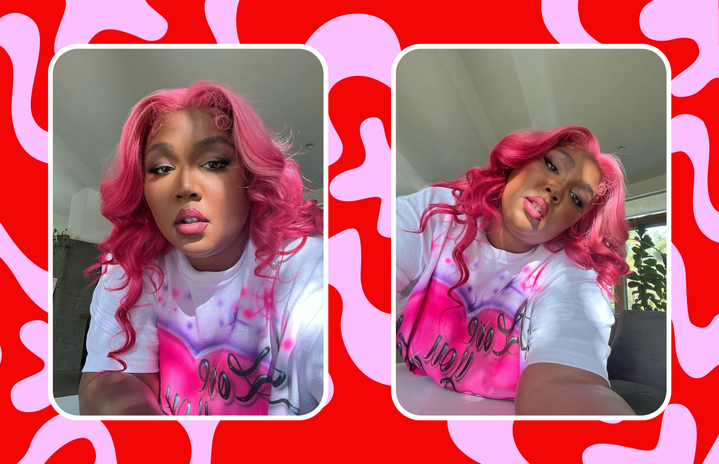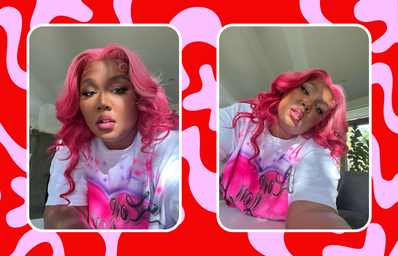From self-love anthems to TikTok-worthy dance songs, Lizzo is the queen of curating songs that make us all the main character and creates a beat anyone can dance to. “Truth Hurts” may have helped you find your worth after a breakup in 2019, “Good As Hell” may make you feel confident, and now Lizzo’s new album Special, which dropped at midnight on July 15, is shaping up to be the serotonin-increasing album of the summer.
Why is it that Lizzo’s music is the ultimate mood booster? Is it the beat? The lyrics? I talked to a music therapist to get to the bottom of the psychology behind Lizzo’s music and why it makes us so happy.
Music has the power to change moods and regulate emotion.
Music is a part of everyone’s lives. There might be certain songs you attribute to a moment in your life or a mood, such as a slow ballad and your wedding day, or a playlist you listen to when you’re sad. Music has the power to change moods and our well-being. According to Select Health, when someone enjoys a song, the limbic system, aka the part of the brain that regulates emotion, increases in activity.
In a 2011 study from McGill University, researchers found that music increases the amount of dopamine in your brain, a chemical that enhances your mood, making it a treatment for depression and other mental illnesses — so much so that music-based therapy is its own specific practice. Music is there for you when you need a cry, a dance break, or a moment where you want to act like you’re in a movie. Simply put, music evokes emotion and the same goes for Lizzo’s songs.
Lizzo’s lyrics resonate with listeners on a deeper level — they are affirmations in musical form.
According to a Well + Good article, words tend to evoke sadness and acoustics evoke happiness, but Lizzo’s songs have both lyrics and acoustics that cause happiness because her songs are relatable.
Alison Hughey, a licensed musical therapist, tells Her Campus, “Lizzo’s lyrics call for empowerment, body positivity, and connection. When someone with such genuine energy has this authenticity in artistry and life, the audience feels the truth. When we hear songs with positive words and encouragement that get stuck in our heads, it’s like affirmations on steroids.”
Lizzo’s lyrics, such as “Woke up feelin’ like I just might run for president / Even if there ain’t no precedent, switchin’ up the messaging / I’m about to add a little estrogen” in her song “Like A Girl,” encourages women to feel empowered and outlines a message deeper than just words to belt in the car. Hughey continues, “Since music is processed in multiple parts of the brain, these statements are mixed in with a disco party of synapses firing. This process makes these words and beliefs ‘stick’ in a powerful way.” Her lyrics give listeners tangible affirmations to apply in their own life.
Lizzo’s songs make us sing and dance, which has a positive effect both mentally and physically.
There is such a thing as “happy hormones,” which are endorphins, serotonin, dopamine, and oxytocin. When you dance and sing, endorphins are released, increasing your mood and enhancing a positive attitude. Additionally, when you sing along to a song, your body will release oxytocin, which is the bonding hormone, creating feelings of trust. Consequently, when songs make you sing and dance whether it be their catchy beat or addicting lyrics, the song themselves are triggering “happy hormones,” and Lizzo’s songs do just that.
Hughey says, “Lizzo’s songs usually have a singable ‘hook.’ When we sing, we stimulate the vagus nerve. It plays a huge role in our mental health and carries information between the brain and body. When we stimulate the vagus nerve with things such as singing and intentional breathing, it can calm our fight/flight/freeze/fawn responses and allow us to think more clearly.” So, when you were singing the chorus to “About Damn Time” on repeat, you were actually calming yourself and increasing your mental well-being.
The beat of Lizzo’s songs can cause people to dance, which the body processes subconsciously. Hughey agrees that Lizzo’s music has a beat that readies our nervous system, causing us to move without knowing it, which in return has a positive effect on our mood.
Lizzo has been a symbol for self-love and empowerment in multiple arenas, including her shapewear line, but her lyrics specifically put into words what we are all feeling, or what we all want to feel. Her music is wired in a way that gets us on our feet or makes us feel like we are professional singers, which allows for an instant mood-booster. She understands the power of lyrics and this is seen in her impact on body positivity, confidence, and happiness in anyone that listens to her songs. Stream Special now!


